Business Ethics: Unethical Behavior Causes and Recommendations
VerifiedAdded on 2023/01/23
|6
|1763
|40
Essay
AI Summary
This essay provides a comprehensive overview of business ethics and managerial responsibility. It begins by defining business ethics and explaining its significance in regulating business transactions and gaining public approval. The essay then addresses the importance of ethical behavior, highlighting its benefits such as preventing malpractices, maintaining transparency, retaining customer loyalty, and ensuring consumer rights. It explores the causes of unethical behavior, including competitive pressures and lack of resources, and suggests business responses like incorporating corporate social responsibility and adopting ethical codes of conduct. The essay concludes by emphasizing the essential role of business ethics in fostering company growth, managing stakeholder relations, and ensuring long-term market survival. The essay also includes references to support the arguments and findings.
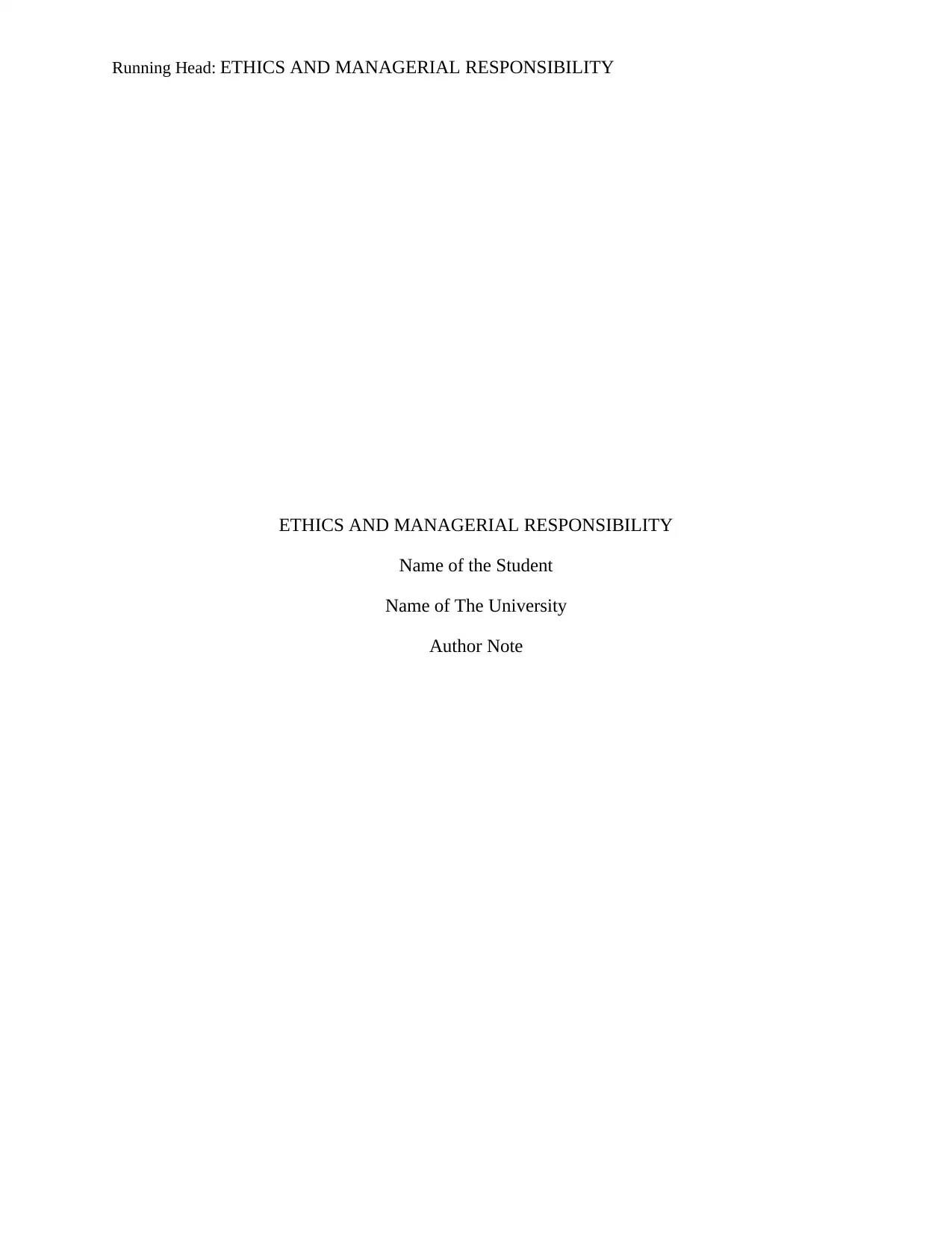
Running Head: ETHICS AND MANAGERIAL RESPONSIBILITY
ETHICS AND MANAGERIAL RESPONSIBILITY
Name of the Student
Name of The University
Author Note
ETHICS AND MANAGERIAL RESPONSIBILITY
Name of the Student
Name of The University
Author Note
Paraphrase This Document
Need a fresh take? Get an instant paraphrase of this document with our AI Paraphraser
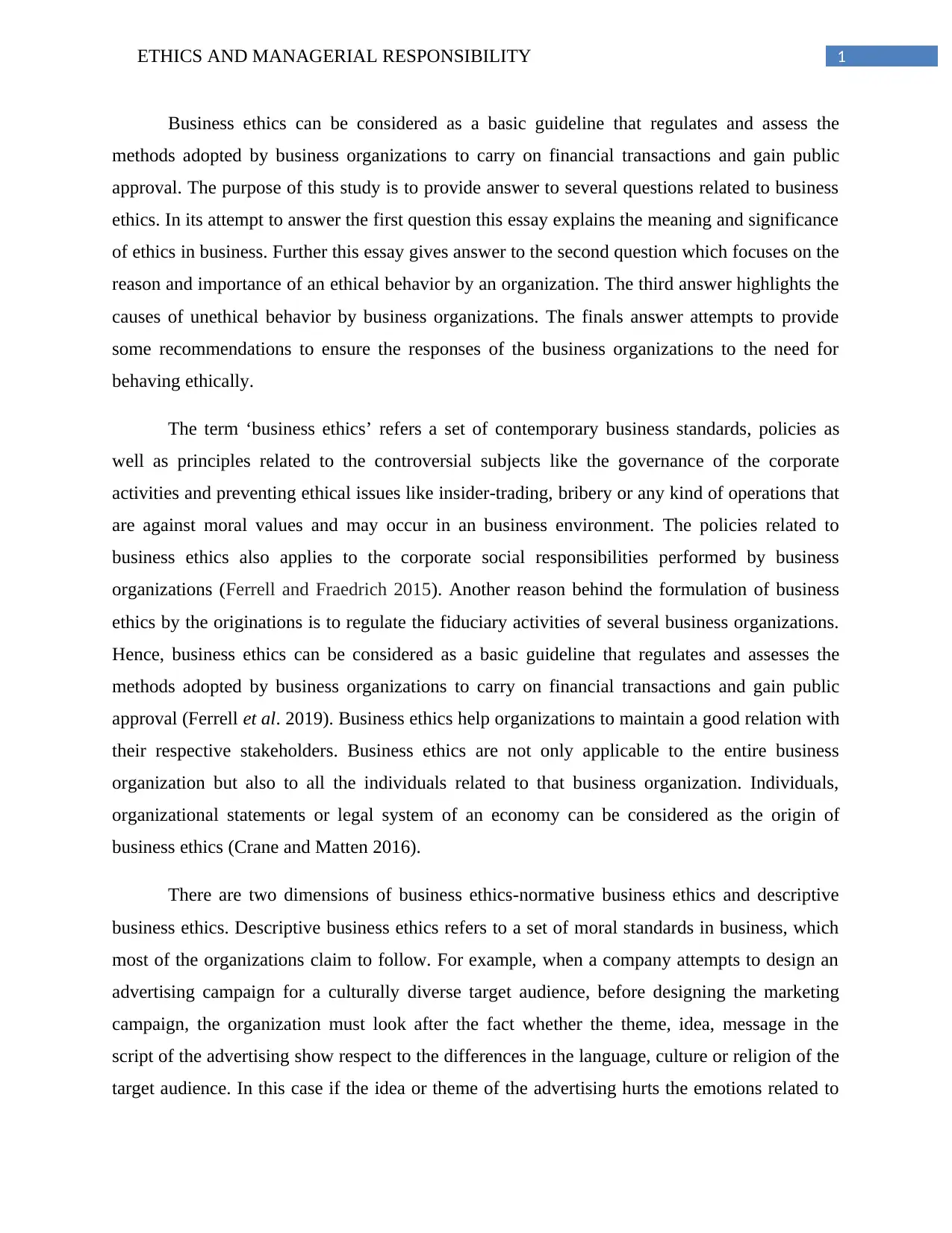
1ETHICS AND MANAGERIAL RESPONSIBILITY
Business ethics can be considered as a basic guideline that regulates and assess the
methods adopted by business organizations to carry on financial transactions and gain public
approval. The purpose of this study is to provide answer to several questions related to business
ethics. In its attempt to answer the first question this essay explains the meaning and significance
of ethics in business. Further this essay gives answer to the second question which focuses on the
reason and importance of an ethical behavior by an organization. The third answer highlights the
causes of unethical behavior by business organizations. The finals answer attempts to provide
some recommendations to ensure the responses of the business organizations to the need for
behaving ethically.
The term ‘business ethics’ refers a set of contemporary business standards, policies as
well as principles related to the controversial subjects like the governance of the corporate
activities and preventing ethical issues like insider-trading, bribery or any kind of operations that
are against moral values and may occur in an business environment. The policies related to
business ethics also applies to the corporate social responsibilities performed by business
organizations (Ferrell and Fraedrich 2015). Another reason behind the formulation of business
ethics by the originations is to regulate the fiduciary activities of several business organizations.
Hence, business ethics can be considered as a basic guideline that regulates and assesses the
methods adopted by business organizations to carry on financial transactions and gain public
approval (Ferrell et al. 2019). Business ethics help organizations to maintain a good relation with
their respective stakeholders. Business ethics are not only applicable to the entire business
organization but also to all the individuals related to that business organization. Individuals,
organizational statements or legal system of an economy can be considered as the origin of
business ethics (Crane and Matten 2016).
There are two dimensions of business ethics-normative business ethics and descriptive
business ethics. Descriptive business ethics refers to a set of moral standards in business, which
most of the organizations claim to follow. For example, when a company attempts to design an
advertising campaign for a culturally diverse target audience, before designing the marketing
campaign, the organization must look after the fact whether the theme, idea, message in the
script of the advertising show respect to the differences in the language, culture or religion of the
target audience. In this case if the idea or theme of the advertising hurts the emotions related to
Business ethics can be considered as a basic guideline that regulates and assess the
methods adopted by business organizations to carry on financial transactions and gain public
approval. The purpose of this study is to provide answer to several questions related to business
ethics. In its attempt to answer the first question this essay explains the meaning and significance
of ethics in business. Further this essay gives answer to the second question which focuses on the
reason and importance of an ethical behavior by an organization. The third answer highlights the
causes of unethical behavior by business organizations. The finals answer attempts to provide
some recommendations to ensure the responses of the business organizations to the need for
behaving ethically.
The term ‘business ethics’ refers a set of contemporary business standards, policies as
well as principles related to the controversial subjects like the governance of the corporate
activities and preventing ethical issues like insider-trading, bribery or any kind of operations that
are against moral values and may occur in an business environment. The policies related to
business ethics also applies to the corporate social responsibilities performed by business
organizations (Ferrell and Fraedrich 2015). Another reason behind the formulation of business
ethics by the originations is to regulate the fiduciary activities of several business organizations.
Hence, business ethics can be considered as a basic guideline that regulates and assesses the
methods adopted by business organizations to carry on financial transactions and gain public
approval (Ferrell et al. 2019). Business ethics help organizations to maintain a good relation with
their respective stakeholders. Business ethics are not only applicable to the entire business
organization but also to all the individuals related to that business organization. Individuals,
organizational statements or legal system of an economy can be considered as the origin of
business ethics (Crane and Matten 2016).
There are two dimensions of business ethics-normative business ethics and descriptive
business ethics. Descriptive business ethics refers to a set of moral standards in business, which
most of the organizations claim to follow. For example, when a company attempts to design an
advertising campaign for a culturally diverse target audience, before designing the marketing
campaign, the organization must look after the fact whether the theme, idea, message in the
script of the advertising show respect to the differences in the language, culture or religion of the
target audience. In this case if the idea or theme of the advertising hurts the emotions related to
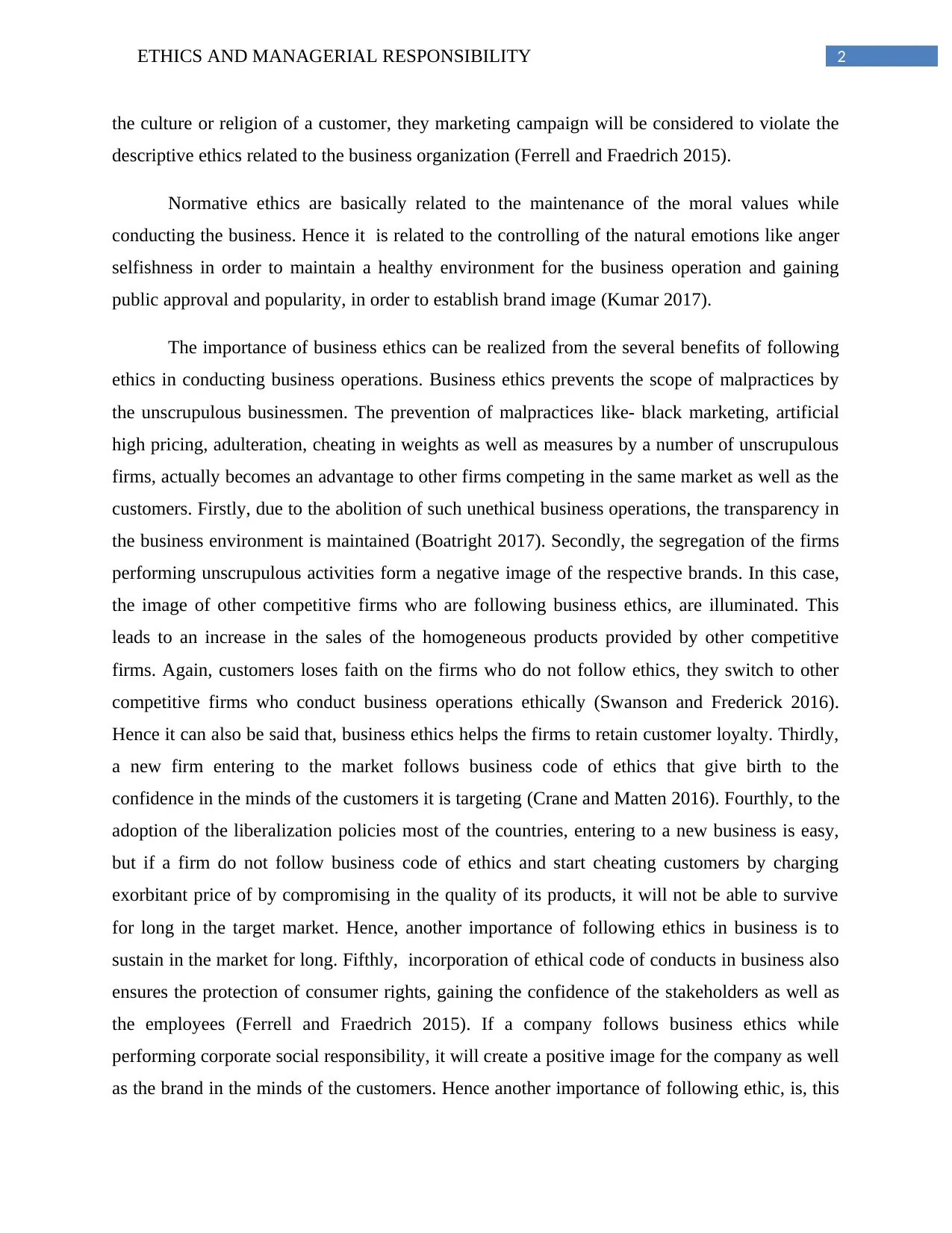
2ETHICS AND MANAGERIAL RESPONSIBILITY
the culture or religion of a customer, they marketing campaign will be considered to violate the
descriptive ethics related to the business organization (Ferrell and Fraedrich 2015).
Normative ethics are basically related to the maintenance of the moral values while
conducting the business. Hence it is related to the controlling of the natural emotions like anger
selfishness in order to maintain a healthy environment for the business operation and gaining
public approval and popularity, in order to establish brand image (Kumar 2017).
The importance of business ethics can be realized from the several benefits of following
ethics in conducting business operations. Business ethics prevents the scope of malpractices by
the unscrupulous businessmen. The prevention of malpractices like- black marketing, artificial
high pricing, adulteration, cheating in weights as well as measures by a number of unscrupulous
firms, actually becomes an advantage to other firms competing in the same market as well as the
customers. Firstly, due to the abolition of such unethical business operations, the transparency in
the business environment is maintained (Boatright 2017). Secondly, the segregation of the firms
performing unscrupulous activities form a negative image of the respective brands. In this case,
the image of other competitive firms who are following business ethics, are illuminated. This
leads to an increase in the sales of the homogeneous products provided by other competitive
firms. Again, customers loses faith on the firms who do not follow ethics, they switch to other
competitive firms who conduct business operations ethically (Swanson and Frederick 2016).
Hence it can also be said that, business ethics helps the firms to retain customer loyalty. Thirdly,
a new firm entering to the market follows business code of ethics that give birth to the
confidence in the minds of the customers it is targeting (Crane and Matten 2016). Fourthly, to the
adoption of the liberalization policies most of the countries, entering to a new business is easy,
but if a firm do not follow business code of ethics and start cheating customers by charging
exorbitant price of by compromising in the quality of its products, it will not be able to survive
for long in the target market. Hence, another importance of following ethics in business is to
sustain in the market for long. Fifthly, incorporation of ethical code of conducts in business also
ensures the protection of consumer rights, gaining the confidence of the stakeholders as well as
the employees (Ferrell and Fraedrich 2015). If a company follows business ethics while
performing corporate social responsibility, it will create a positive image for the company as well
as the brand in the minds of the customers. Hence another importance of following ethic, is, this
the culture or religion of a customer, they marketing campaign will be considered to violate the
descriptive ethics related to the business organization (Ferrell and Fraedrich 2015).
Normative ethics are basically related to the maintenance of the moral values while
conducting the business. Hence it is related to the controlling of the natural emotions like anger
selfishness in order to maintain a healthy environment for the business operation and gaining
public approval and popularity, in order to establish brand image (Kumar 2017).
The importance of business ethics can be realized from the several benefits of following
ethics in conducting business operations. Business ethics prevents the scope of malpractices by
the unscrupulous businessmen. The prevention of malpractices like- black marketing, artificial
high pricing, adulteration, cheating in weights as well as measures by a number of unscrupulous
firms, actually becomes an advantage to other firms competing in the same market as well as the
customers. Firstly, due to the abolition of such unethical business operations, the transparency in
the business environment is maintained (Boatright 2017). Secondly, the segregation of the firms
performing unscrupulous activities form a negative image of the respective brands. In this case,
the image of other competitive firms who are following business ethics, are illuminated. This
leads to an increase in the sales of the homogeneous products provided by other competitive
firms. Again, customers loses faith on the firms who do not follow ethics, they switch to other
competitive firms who conduct business operations ethically (Swanson and Frederick 2016).
Hence it can also be said that, business ethics helps the firms to retain customer loyalty. Thirdly,
a new firm entering to the market follows business code of ethics that give birth to the
confidence in the minds of the customers it is targeting (Crane and Matten 2016). Fourthly, to the
adoption of the liberalization policies most of the countries, entering to a new business is easy,
but if a firm do not follow business code of ethics and start cheating customers by charging
exorbitant price of by compromising in the quality of its products, it will not be able to survive
for long in the target market. Hence, another importance of following ethics in business is to
sustain in the market for long. Fifthly, incorporation of ethical code of conducts in business also
ensures the protection of consumer rights, gaining the confidence of the stakeholders as well as
the employees (Ferrell and Fraedrich 2015). If a company follows business ethics while
performing corporate social responsibility, it will create a positive image for the company as well
as the brand in the minds of the customers. Hence another importance of following ethic, is, this
⊘ This is a preview!⊘
Do you want full access?
Subscribe today to unlock all pages.

Trusted by 1+ million students worldwide
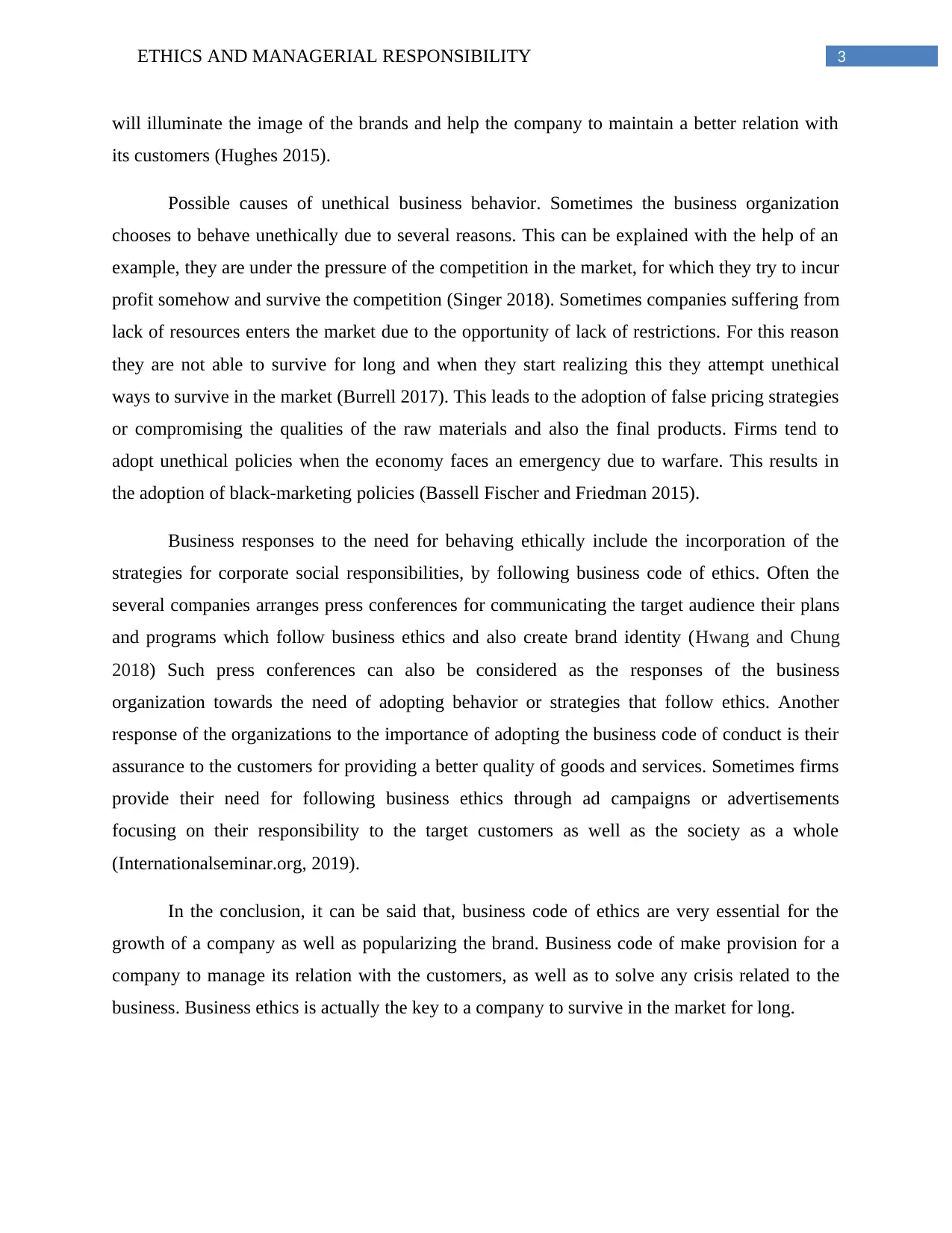
3ETHICS AND MANAGERIAL RESPONSIBILITY
will illuminate the image of the brands and help the company to maintain a better relation with
its customers (Hughes 2015).
Possible causes of unethical business behavior. Sometimes the business organization
chooses to behave unethically due to several reasons. This can be explained with the help of an
example, they are under the pressure of the competition in the market, for which they try to incur
profit somehow and survive the competition (Singer 2018). Sometimes companies suffering from
lack of resources enters the market due to the opportunity of lack of restrictions. For this reason
they are not able to survive for long and when they start realizing this they attempt unethical
ways to survive in the market (Burrell 2017). This leads to the adoption of false pricing strategies
or compromising the qualities of the raw materials and also the final products. Firms tend to
adopt unethical policies when the economy faces an emergency due to warfare. This results in
the adoption of black-marketing policies (Bassell Fischer and Friedman 2015).
Business responses to the need for behaving ethically include the incorporation of the
strategies for corporate social responsibilities, by following business code of ethics. Often the
several companies arranges press conferences for communicating the target audience their plans
and programs which follow business ethics and also create brand identity (Hwang and Chung
2018) Such press conferences can also be considered as the responses of the business
organization towards the need of adopting behavior or strategies that follow ethics. Another
response of the organizations to the importance of adopting the business code of conduct is their
assurance to the customers for providing a better quality of goods and services. Sometimes firms
provide their need for following business ethics through ad campaigns or advertisements
focusing on their responsibility to the target customers as well as the society as a whole
(Internationalseminar.org, 2019).
In the conclusion, it can be said that, business code of ethics are very essential for the
growth of a company as well as popularizing the brand. Business code of make provision for a
company to manage its relation with the customers, as well as to solve any crisis related to the
business. Business ethics is actually the key to a company to survive in the market for long.
will illuminate the image of the brands and help the company to maintain a better relation with
its customers (Hughes 2015).
Possible causes of unethical business behavior. Sometimes the business organization
chooses to behave unethically due to several reasons. This can be explained with the help of an
example, they are under the pressure of the competition in the market, for which they try to incur
profit somehow and survive the competition (Singer 2018). Sometimes companies suffering from
lack of resources enters the market due to the opportunity of lack of restrictions. For this reason
they are not able to survive for long and when they start realizing this they attempt unethical
ways to survive in the market (Burrell 2017). This leads to the adoption of false pricing strategies
or compromising the qualities of the raw materials and also the final products. Firms tend to
adopt unethical policies when the economy faces an emergency due to warfare. This results in
the adoption of black-marketing policies (Bassell Fischer and Friedman 2015).
Business responses to the need for behaving ethically include the incorporation of the
strategies for corporate social responsibilities, by following business code of ethics. Often the
several companies arranges press conferences for communicating the target audience their plans
and programs which follow business ethics and also create brand identity (Hwang and Chung
2018) Such press conferences can also be considered as the responses of the business
organization towards the need of adopting behavior or strategies that follow ethics. Another
response of the organizations to the importance of adopting the business code of conduct is their
assurance to the customers for providing a better quality of goods and services. Sometimes firms
provide their need for following business ethics through ad campaigns or advertisements
focusing on their responsibility to the target customers as well as the society as a whole
(Internationalseminar.org, 2019).
In the conclusion, it can be said that, business code of ethics are very essential for the
growth of a company as well as popularizing the brand. Business code of make provision for a
company to manage its relation with the customers, as well as to solve any crisis related to the
business. Business ethics is actually the key to a company to survive in the market for long.
Paraphrase This Document
Need a fresh take? Get an instant paraphrase of this document with our AI Paraphraser
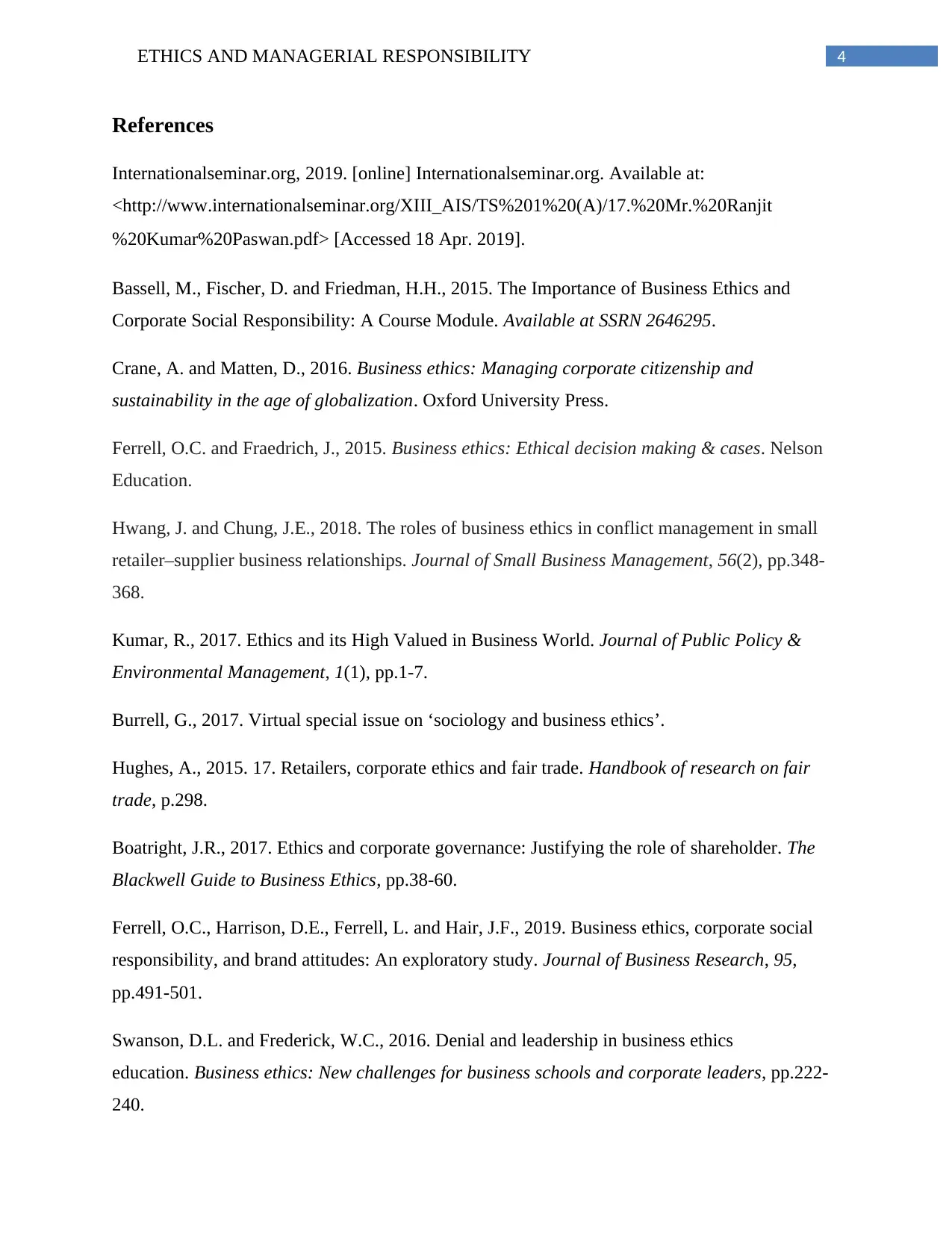
4ETHICS AND MANAGERIAL RESPONSIBILITY
References
Internationalseminar.org, 2019. [online] Internationalseminar.org. Available at:
<http://www.internationalseminar.org/XIII_AIS/TS%201%20(A)/17.%20Mr.%20Ranjit
%20Kumar%20Paswan.pdf> [Accessed 18 Apr. 2019].
Bassell, M., Fischer, D. and Friedman, H.H., 2015. The Importance of Business Ethics and
Corporate Social Responsibility: A Course Module. Available at SSRN 2646295.
Crane, A. and Matten, D., 2016. Business ethics: Managing corporate citizenship and
sustainability in the age of globalization. Oxford University Press.
Ferrell, O.C. and Fraedrich, J., 2015. Business ethics: Ethical decision making & cases. Nelson
Education.
Hwang, J. and Chung, J.E., 2018. The roles of business ethics in conflict management in small
retailer–supplier business relationships. Journal of Small Business Management, 56(2), pp.348-
368.
Kumar, R., 2017. Ethics and its High Valued in Business World. Journal of Public Policy &
Environmental Management, 1(1), pp.1-7.
Burrell, G., 2017. Virtual special issue on ‘sociology and business ethics’.
Hughes, A., 2015. 17. Retailers, corporate ethics and fair trade. Handbook of research on fair
trade, p.298.
Boatright, J.R., 2017. Ethics and corporate governance: Justifying the role of shareholder. The
Blackwell Guide to Business Ethics, pp.38-60.
Ferrell, O.C., Harrison, D.E., Ferrell, L. and Hair, J.F., 2019. Business ethics, corporate social
responsibility, and brand attitudes: An exploratory study. Journal of Business Research, 95,
pp.491-501.
Swanson, D.L. and Frederick, W.C., 2016. Denial and leadership in business ethics
education. Business ethics: New challenges for business schools and corporate leaders, pp.222-
240.
References
Internationalseminar.org, 2019. [online] Internationalseminar.org. Available at:
<http://www.internationalseminar.org/XIII_AIS/TS%201%20(A)/17.%20Mr.%20Ranjit
%20Kumar%20Paswan.pdf> [Accessed 18 Apr. 2019].
Bassell, M., Fischer, D. and Friedman, H.H., 2015. The Importance of Business Ethics and
Corporate Social Responsibility: A Course Module. Available at SSRN 2646295.
Crane, A. and Matten, D., 2016. Business ethics: Managing corporate citizenship and
sustainability in the age of globalization. Oxford University Press.
Ferrell, O.C. and Fraedrich, J., 2015. Business ethics: Ethical decision making & cases. Nelson
Education.
Hwang, J. and Chung, J.E., 2018. The roles of business ethics in conflict management in small
retailer–supplier business relationships. Journal of Small Business Management, 56(2), pp.348-
368.
Kumar, R., 2017. Ethics and its High Valued in Business World. Journal of Public Policy &
Environmental Management, 1(1), pp.1-7.
Burrell, G., 2017. Virtual special issue on ‘sociology and business ethics’.
Hughes, A., 2015. 17. Retailers, corporate ethics and fair trade. Handbook of research on fair
trade, p.298.
Boatright, J.R., 2017. Ethics and corporate governance: Justifying the role of shareholder. The
Blackwell Guide to Business Ethics, pp.38-60.
Ferrell, O.C., Harrison, D.E., Ferrell, L. and Hair, J.F., 2019. Business ethics, corporate social
responsibility, and brand attitudes: An exploratory study. Journal of Business Research, 95,
pp.491-501.
Swanson, D.L. and Frederick, W.C., 2016. Denial and leadership in business ethics
education. Business ethics: New challenges for business schools and corporate leaders, pp.222-
240.
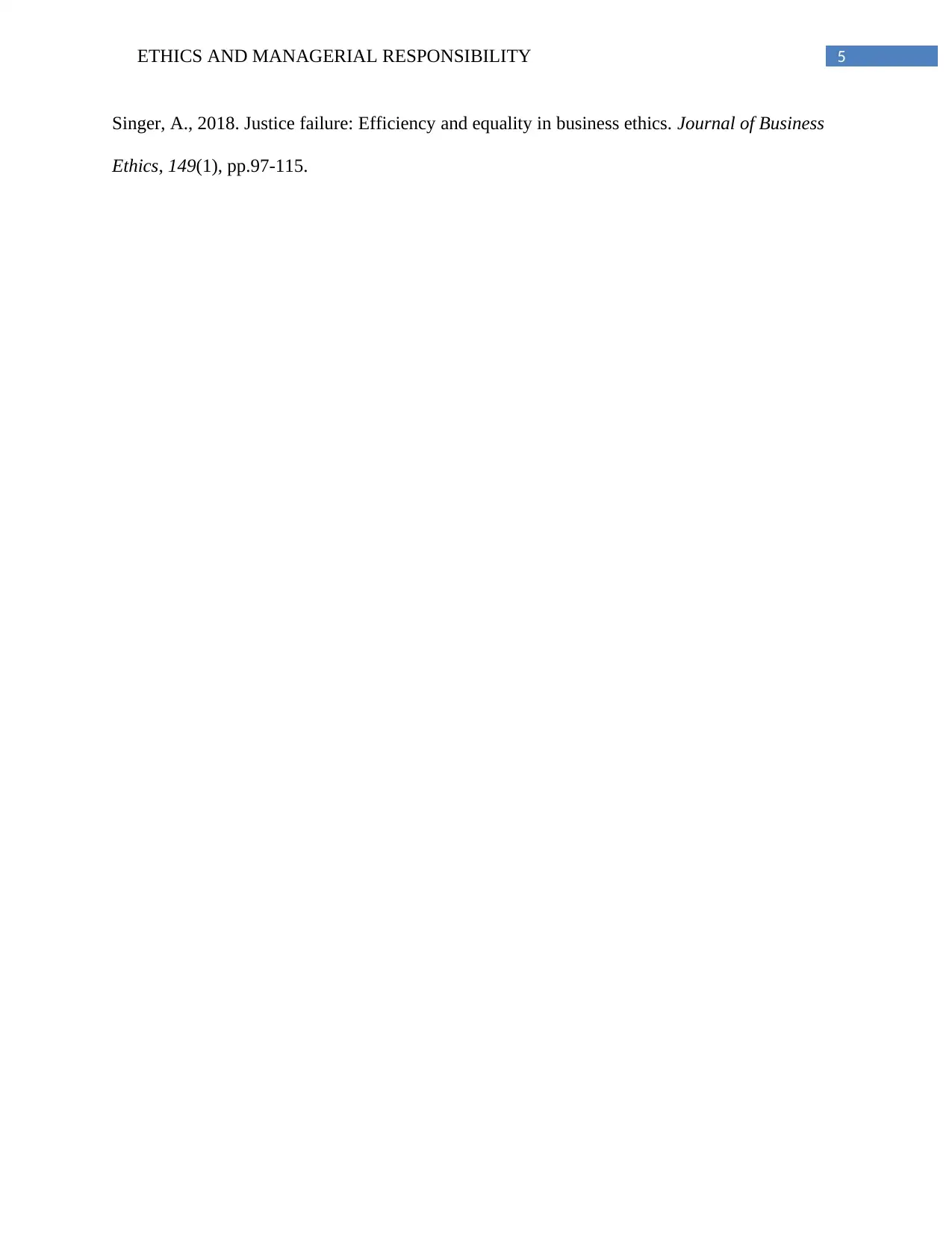
5ETHICS AND MANAGERIAL RESPONSIBILITY
Singer, A., 2018. Justice failure: Efficiency and equality in business ethics. Journal of Business
Ethics, 149(1), pp.97-115.
Singer, A., 2018. Justice failure: Efficiency and equality in business ethics. Journal of Business
Ethics, 149(1), pp.97-115.
⊘ This is a preview!⊘
Do you want full access?
Subscribe today to unlock all pages.

Trusted by 1+ million students worldwide
1 out of 6
Related Documents
Your All-in-One AI-Powered Toolkit for Academic Success.
+13062052269
info@desklib.com
Available 24*7 on WhatsApp / Email
![[object Object]](/_next/static/media/star-bottom.7253800d.svg)
Unlock your academic potential
Copyright © 2020–2025 A2Z Services. All Rights Reserved. Developed and managed by ZUCOL.





